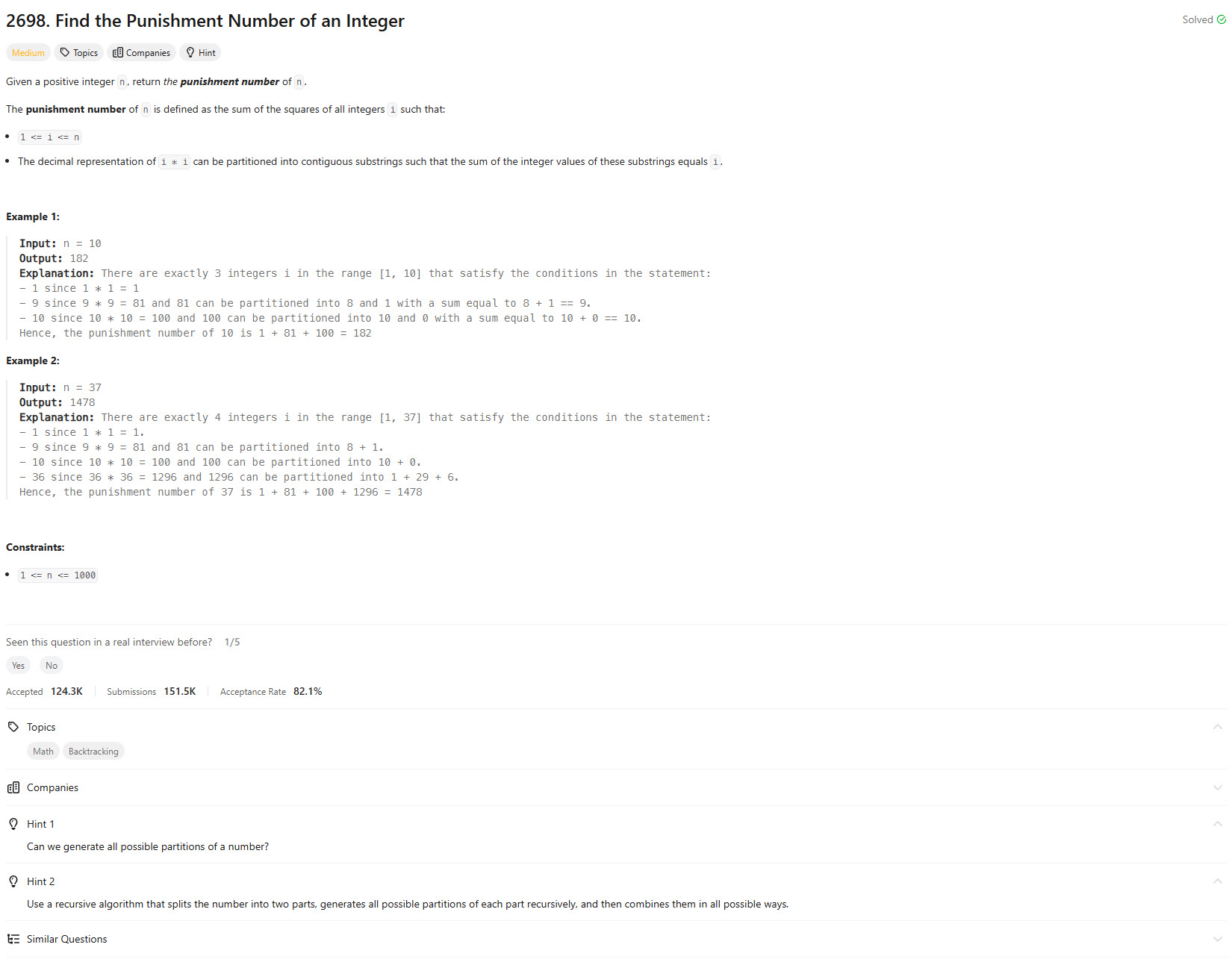Problem of The Day: Find the Punishment Number of an Integer
Problem Statement

Intuition
The problem requires finding numbers whose squared value can be partitioned into segments that sum up to the original number. The core idea is to iterate through numbers, square them, and check if the square can be split into segments summing to the original number.
Approach
- Iterate Through Numbers: Loop through numbers from 1 to
n, calculating their square value. - Recursive Backtracking: Implement a helper function
is_punishment_numberto determine if the squared value can be partitioned into segments summing to the original number.- Convert the squared number into a string.
- Try different partitions using recursion.
- If a valid partition is found, return
True.
- Summing Valid Squared Values: If a number satisfies the condition, add its square to the result.
Complexity
- Time Complexity:
- The backtracking approach tries different partitions, leading to an exponential time complexity in the worst case: \(O(2^m)\) where
mis the number of digits inn^2.
- The backtracking approach tries different partitions, leading to an exponential time complexity in the worst case: \(O(2^m)\) where
- Space Complexity:
- The recursion depth is limited to the number of digits in
n^2, so the space complexity is \(O(m)\).
- The recursion depth is limited to the number of digits in
Code
class Solution:
def punishmentNumber(self, n: int) -> int:
res = 0
def is_punishment_number(start, num, target, curr):
num_str = str(num)
if start == len(num_str):
return sum(curr) == target
for i in range(start, len(num_str)):
curr.append(int(num_str[start:i + 1]))
if is_punishment_number(i + 1, num, target, curr):
return True
curr.pop()
return False
for i in range(1, n + 1):
square_val = i * i
if is_punishment_number(0, square_val, i, []):
res += square_val
return res
Editorial
Approach 1: Memoization
class Solution:
def find_partitions(
self, start_index, current_sum, string_num, target, memo
):
# Check if partition is valid
if start_index == len(string_num):
return current_sum == target
# Invalid partition found, so we return False
if current_sum > target:
return False
# If the result for this state is already calculated, return it
if memo[start_index][current_sum] != -1:
return memo[start_index][current_sum] == 1
partition_found = False
# Iterate through all possible substrings starting with start_index
for current_index in range(start_index, len(string_num)):
# Create partition
current_string = string_num[start_index : current_index + 1]
addend = int(current_string)
# Recursively check if valid partition can be found
partition_found = partition_found or self.find_partitions(
current_index + 1,
current_sum + addend,
string_num,
target,
memo,
)
if partition_found:
memo[start_index][current_sum] = 1
return True
# Memoize the result for future reference and return its result
memo[start_index][current_sum] = 0
return False
def punishmentNumber(self, n: int) -> int:
punishment_num = 0
# Iterate through numbers in range [1, n]
for current_num in range(1, n + 1):
square_num = current_num * current_num
string_num = str(square_num)
# Initialize values in memoization array
memo_array = [
[-1] * (current_num + 1) for _ in range(len(string_num))
]
# Check if valid partition can be found and add squared number if so
if self.find_partitions(0, 0, string_num, current_num, memo_array):
punishment_num += square_num
return punishment_num
Approach 2: Recursion of Strings
class Solution:
def can_partition(self, string_num, target):
# Valid Partition Found
if not string_num and target == 0:
return True
# Invalid Partition Found
if target < 0:
return False
# Recursively check all partitions for a valid partition
for index in range(len(string_num)):
left = string_num[: index + 1]
right = string_num[index + 1 :]
left_num = int(left)
if self.can_partition(right, target - left_num):
return True
return False
def punishmentNumber(self, n: int) -> int:
punishment_num = 0
# Iterate through numbers in range [1, n]
for current_num in range(1, n + 1):
square_num = current_num * current_num
# Check if valid partition can be found and add squared number if so
if self.can_partition(str(square_num), current_num):
punishment_num += square_num
return punishment_num
Approach 3: Recursion of Integers
class Solution:
def can_partition(self, num, target):
# Invalid partition found
if target < 0 or num < target:
return False
# Valid partition found
if num == target:
return True
# Recursively check all partitions for a valid partition
return (
self.can_partition(num // 10, target - num % 10)
or self.can_partition(num // 100, target - num % 100)
or self.can_partition(num // 1000, target - num % 1000)
)
def punishmentNumber(self, n: int) -> int:
punishment_num = 0
# Iterate through numbers in range [1, n]
for current_num in range(1, n + 1):
square_num = current_num * current_num
# Check if valid partition can be found and add squared number if so
if self.can_partition(square_num, current_num):
punishment_num += square_num
return punishment_num